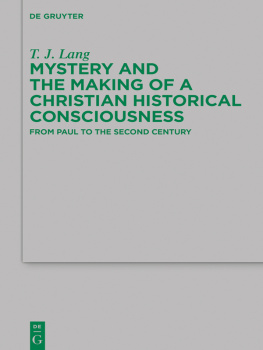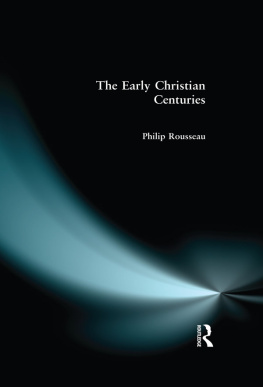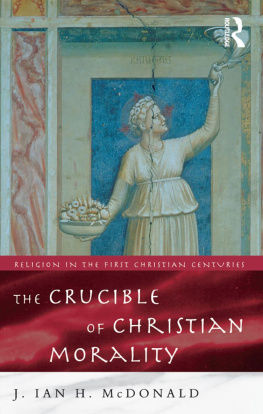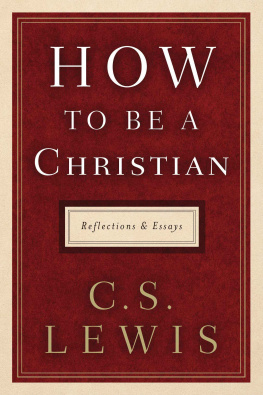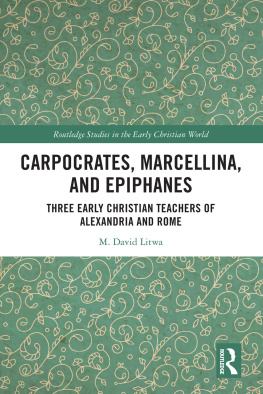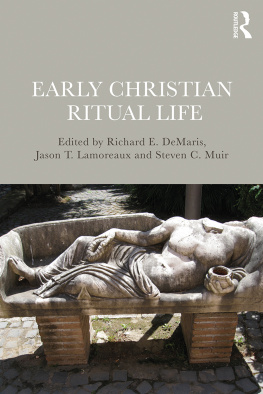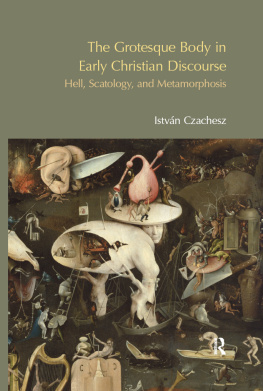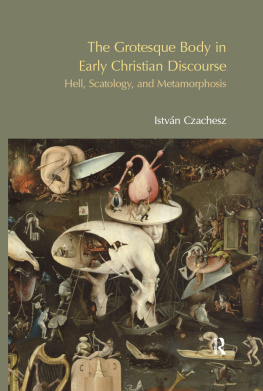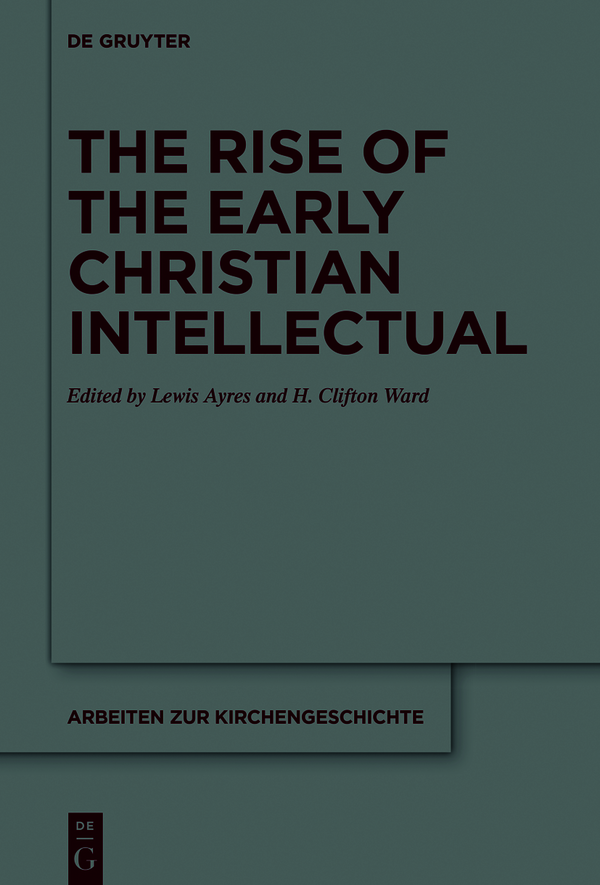Arbeiten zur Kirchengeschichte
Edited by
Christian Albrecht
Karl Holl
Hans Lietzmann
Christoph Markschies
Christopher Ocker
Joachim Mehlhausen
Gerhard Mller
Volume
ISBN 9783110607550
e-ISBN (PDF) 9783110608632
e-ISBN (EPUB) 9783110608007
Bibliographic information published by the Deutsche Nationalbibliothek
The Deutsche Nationalbibliothek lists this publication in the Deutsche Nationalbibliografie; detailed bibliographic data are available on the Internet at http://dnb.dnb.de.
2020 Walter de Gruyter GmbH, Berlin/Boston
Preface
Christoph Markschies
This volume contains contributions to a seminar on The Rise of the Christian Intellectual, and perhaps I was not only asked by the editors to write a preface because I took part in the meeting in 2016, but also because I wrote some years ago an article about Intellectuals and Church Fathers. At that time I admittedly did not discuss groups of people in Rome during the early imperial period, but rather in the Holy Land during the third and fourth centuries. Nevertheless, a simple repetition of my comments from that time would be unwarranted, not only for the reason that their focus was on late antiquity and the East of the Roman Empire. Moreover, it seems to me now, when I reread my remarks from that time, which were only belatedly published, that I had only just begun to identify the problem of the use of the term intellectual in a history of ancient Christianity. I must therefore return to my comments at that time and develop them in more detail.
At that time I said that the concept of Christianity as a religion characterised by intellectuals can be traced back in the German case as Hans Georg Kippenberg has shown So far, so good. This concept of intellectual, which is functional and concentrated on rationalization, is entirely suitable for examining particular traits of ancient Christian thought on the topic of religion in the imperial period, as well as for describing more precisely groups of early imperial philosophers.
Yet the use of the term intellectual as developed by Weber is by no means unproblematic, at least for the purposes of analyzing early Christianity and this problem was unfortunately only partially clear to me around twenty years ago. What are the potential problems here? First, it seems to me that Weber himself would not have apostrophized many of the people whom will be mentioned in this volume as intellectuals in the strict sense of the word. For Weber, ancient Christianity was essentially anti-intellectual and petty bourgeois,
A second problem with following Max Weber in using the term intellectuals is that he adopted a view of imperial Christian theology of the second century that primarily originated from the German religious-historical school and that few people hold today. This is entirely evident when you look at his view of so-called Gnosticism. Weber refers to the Gnostics, as we have seen, very much as intellectuals of the second century but he does not especially consider them a characteristic group within ancient Christianity. In this sense, his view fundamentally differs from Harnack, who famously understood the Gnostics as the first Christian theologians.
In view of these clear differences between the religious-historical understanding of ancient Christianity and ancient Gnosticism (I assume here that one may speak of such a phenomenon faute de mieux), that Weber assumed and the understanding subscribed to today, what remains from the concept of intellectual as Weber defined it? Should one ever use this concept and/or term in the context of ancient Christianity? I believe that one may refer to intellectuals as a category, even if one uses the term in a somewhat different fashion than Max Weber. This could be a reason enough to examine once again these classic theses concerning groups of imperial intellectuals.
In my initial remarks I pointed to the problems that arise when we try to apply the concept of the intellectual to ancient Christian theologians during the early Roman Empire. To summarize here: we take up a whole slew of assumptions that are connected to the functionalist concept of the intellectual in Weber. Of course, one can use this functionalist concept to describe Christian theology in the second century, provided one is prepared to accept the reductionism of this approach as regards to content. Ekkehard Mhlenberg, some time ago, drew our attention to the costs of such an ontological reductionism, which has in fact since been thoroughly philosophically accepted. The concept of the intellectual is like all concepts that do not originate in our sources, but are formed much later: we cannot get away from them, we see many things more clearly in their light, but we must not underestimate their problems and should in no case overestimate their power. This volume, The Rise of the Christian Intellectual, offers many excellent examples showing the power of this terminology!
Abbreviations
(not found in lanne philologique)
AJT
Asia Journal of Theology
AKGWG
Abhandlungen der Kniglichen Gesellschaft der Wissenschaften zu Gttingen
AKSGW
Abhandlungen der Kniglich Schsischen Gesellschaft der Wissenschaften
ANRW
Aufstieg und Niedergang der rmischen Welt
CBQ
Catholic Biblical Quarterly
CMG
Corpus Medicorum Graecorum
HvTSt
Hervormde teologiese studies
JJS
Journal of Jewish Studies
JLA
Journal of Late Antiquity
JOIE
Journal of Institutional Economics
JSHJ
Journal for the Study of the Historical Jesus
JSNT
Journal for the Study of the New Testament
LCL
Loeb Classical Library
MTZ
Mnchener theologische Zeitschrift
NedTT
Nederlands theologisch tijdschrift
NGG
Nachrichten von der Gesellschaft der Wissenschaften zu Gttingen
PO
Patrologia Orientalis
ProEccl
Pro Ecclesia
RAC
Reallexikon fr Antike und Christentum. Edited by T. Kluser. Stuttgart, 1950
RCatT
Revista catalana de teologia
SC
Sources chretiennes. Paris: ditions du Cerf, 1943
SecCent
Second Century
StPatr
Studia Patristica
SVTQ
St. Vladimirs Theological Quarterly
Notes
C. Markschies, Intellectuals and Church Fathers in the Third and Fourth Centuries, in Christians and Christianity in the Holy Land: From the Origins to the Latin Kingdoms, ed. O. Limor and G. Stroumsa (Leiden: Brill, 2006), 23956. Ive finished the manuscript at the end of the year 1999.
H.G. Kippenberg, Intellektuellen-Religion, in Die Religion von Oberschichten: Religion Profession Intellektualismus, ed. P. Antes and D. Pahnke (Marburg: Diagonal, 1989), 181202. Contrary to the German case Intellectual in its original French conception is a deeply political concept (cf. P. Ory and J.-F. Sirinelli, Les intellectuels en France de laffaire Dreyfus nos jours (Paris: Colin, 1986): it designates the well-educated author and thinker who is outside the government and of threatened delegitimation. Weber germanised the concept by neutering its political content. Instead, he hegelianizes it: the intellectuals form part of the world historical process by which, independently of their own personal intentions, the gradual rationalization of the world spirit is pushed onwards (Glen W. Most, in a letter, 10.9.2016).
D. Bering, Die Intellektuellen: Geschichte eines Schimpfwortes (Frankfurt/Main: Ullstein, 1982), 3267.


